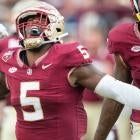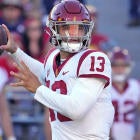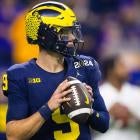Week 7's edition of 'Thursday Night Football' features two of the top 10 picks in the 2018 NFL Draft, and we'll actually get to see them both on the field at the same time.
There were some who thought the Denver Broncos might be interested in a quarterback near the top of the draft, but when pass-rusher Bradley Chubb fell into their laps, John Elway and company pulled the trigger and gave Von Miller a partner in crime. A few picks later, the Cardinals traded up for a quarterback, making Josh Rosen the fourth passer off the board after Baker Mayfield, Sam Darnold, and Josh Allen.
Rosen has shown some flashes of interesting talent this season, including the ability to fit the ball into tight passing windows. He looks like the kind of player who could lead Arizona for quite a while. The Broncos, meanwhile, seem likely to be searching for a new quarterback after this season, as free agent signing Case Keenum has not worked out quite as well as expected.
Of course, what happened in the first six weeks of the year may or may not have much bearing on what happens this Thursday (8:20 p.m., NFL Network, Fox, stream on FUBO). Will Rosen or Keenum lead their team to a victory?
When the Broncos have the ball
The Broncos' offense has been wildly inconsistent throughout this season, largely due to the up-and-down play of quarterback Case Keenum. Denver got arguably the worst quarterback play in the NFL in 2017, with Trevor Siemian, Paxton Lynch, and Brock Osweiler combining to complete 59 percent of their passes at 6.5 yards per attempt while throwing 19 touchdowns against 22 interceptions. After Keenum's fantastic season in Minnesota, the Broncos targeting him early in free agency and gave him a sizable deal, assuming that he'd be an obvious upgrade over the departed trio. Six games into the year, it's not entirely clear that's the (I'm really sorry about this) case.
Prior to last season, Keenum had shown himself to be, at best, a below-average starter. Most of the time, he looked more like a vaguely capable backup. But in pairing with Pat Shurmur, Adam Thielen, Stefon Diggs, and Kyle Rudolph, he shined for much of the 2017 campaign. His play in 2018 has made him look much more like the player he was prior to last year.
| Year | Team | Comp % | YPA | TD% | INT% | RTG |
| 2013-2016 | HOU/RAM | 58.4 | 6.7 | 3.1 | 2.6 | 78.4 |
| 2017 | MIN | 67.6 | 7.4 | 4.6 | 1.5 | 98.3 |
| 2018 | DEN | 63.1 | 7.2 | 3.0 | 3.4 | 80.5 |
Keenum has not shown much chemistry with any non-Emmanuel Sanders receiver, and he has struggled badly to throw the ball downfield. On passes traveling 15 yards in the air or more, Keenum is just 20 of 41 for 591 yards, two touchdowns and four interceptions, according to Sports Info Solutions. Compare that to last year when he was 44 of 103 for 1,118 yards, eight touchdowns and three picks. He's already exceeded last year's interception total on those types of passes, while his passer rating has dropped from 94.9 to 71.5.
Arizona's pass defense has been strong this season, and in particular has been strong against the deep pass. No team in the NFL has been better against passes traveling 15 yards in the air or more, according to Football Outsiders' DVOA. Arizona has been somewhat willing to concede the short pass in order to come up and tackle, and the Broncos may have to settle for attempting to move the ball downfield that way rather than searching for big plays.
While Keenum has struggled this year, the Broncos' rookie-led run game has actually fared well. Third-round pick Royce Freeman and undrafted free agent Phillip Lindsay have formed a solid backfield duo, with each player averaging better than 4.7 yards per carry. Combined, they have toted the ball 119 times for 618 yards and four scores, and the Broncos lead the NFL in yards per rush and are 10th in yards per game despite ranking 21st in attempts.
Lindsay is the more versatile of the two players and appears to be the preferred back in pass situations, but Freeman has shown a strong ability to break tackles and generate yards after contact. His 15 broken tackles in the run game rank third in the NFL behind only Melvin Gordon and Chris Carson, and his rate of one broken tackle every 3.8 carries is second-best among the 70 NFL players who have run the ball at least 20 times. The Cardinals have had 17 tackle attempts broken by opposing running backs this season, one of the highest figures in the NFL, so Freeman's power game could be more key than usual in this particular matchup.
When the Cardinals have the ball
Only one team in the NFL has scored fewer points than the Cardinals this season, and that team has been quarterbacked by Nathan Peterman and Josh Allen, so it doesn't really count. Arizona struggled early on with Sam Bradford under center and has since made the switch over to rookie Josh Rosen. Even with Rosen under center, the Cardinals have failed to crack even 300 total yards in a single game, making them one of just two teams that has yet to pass that barrier.
Arizona's problems have been many, but the lack of creativity in the way the team has used star running back David Johnson really sticks out as a source of their extreme inability to move the ball with any level of consistency. Johnson is one of the most versatile players in the NFL as a 6-foot-1, 224-pound running back who has the route-running and catching ability of a wide receiver, but the Cardinals have largely been content to run him up the middle and throw him simple swing and circle routes rather than moving him around the formation and getting him into open space.
Johnson has also been running into stacked boxes, with 68 of his 92 carries coming when the defense has had seven players in the box or more, according to Sports Info Solutions. That rate of 74 percent is quite a bit higher than his breakout 2016 season, when 68 percent of his runs came against seven-plus men in the box. Those runs have been even less effective this season than they were then, however, as his yards per carry average on those plays has dropped from 4.05 to 3.13.
Without Johnson playing at his best, the Cardinals' passing game has been repeatedly put in less than advantageous situations. Bradford was unable to make much of anything happen when he was on the field, and while Rosen has been better, he has also been prone to rookie mistakes. Rosen is at least firing the ball downfield at a much greater rate than Bradford, allowing the Cardinals to create some chunk plays that they were sorely missing at the beginning of the year. Just 14 of Bradford's 80 pass attempts traveled 15 or more yards in the air, and he completed only six of those passes for 154 yards, two touchdowns, and three picks. Rosen, on the other hand, has thrown 23 of his 90 pass attempts more than 15 yards downfield, completing 10 for 296 yards and two scores. Rosen has shown a fair amount of trust in fellow rookie Christian Kirk, who has 13 catches for 190 yards and a score in Rosen's three starts.
It's still extremely tough to move the ball against Denver through the air, even after the team traded Aqib Talib last offseason. Chris Harris Jr. remains one of the NFL's premiere corners, and the Von Milled-led pass rush can still hit home. The Broncos have somewhat struggled to contain tight ends in the passing game, and if Rosen and Ricky Seals-Jones can get on the same page as they were for much of last week's game against the Vikings, some big plays could be there over the middle of the field.
Still, the best way to move the ball on the Broncos is on the ground, and that appears to be the one thing the Cardinals are most incapable of doing. The smart money is on Arizona struggling to really get untracked offensively, leaving everything on Rosen's right shoulder. And that's not a great situation to be in when Miller and company are bearing down on a young QB.
Prediction: Broncos 23, Cardinals 14






















